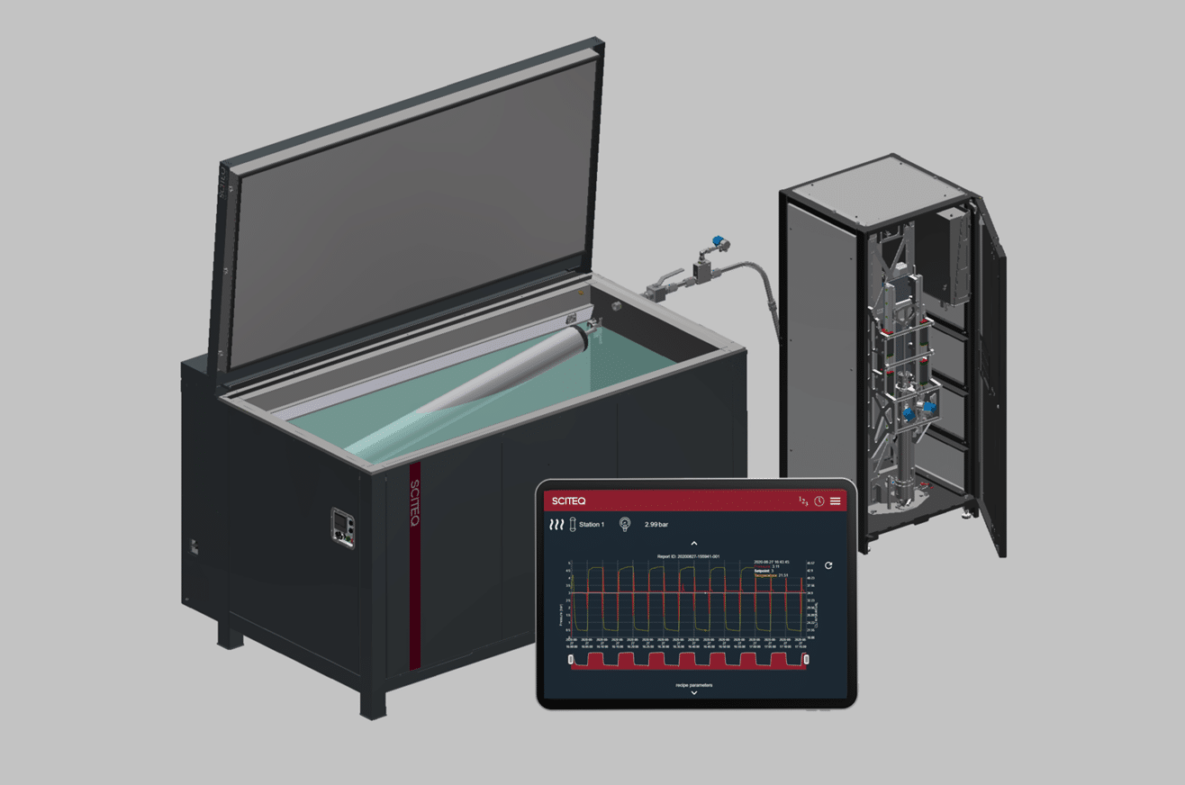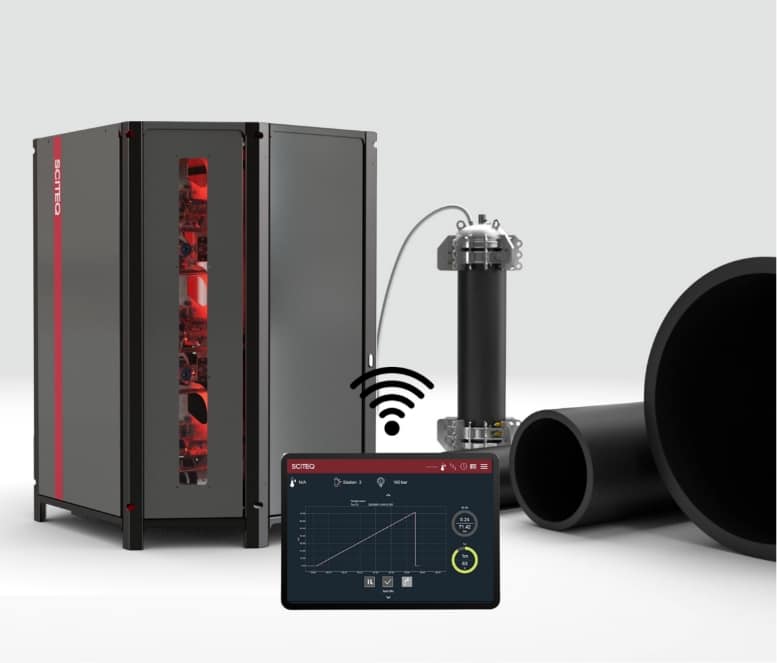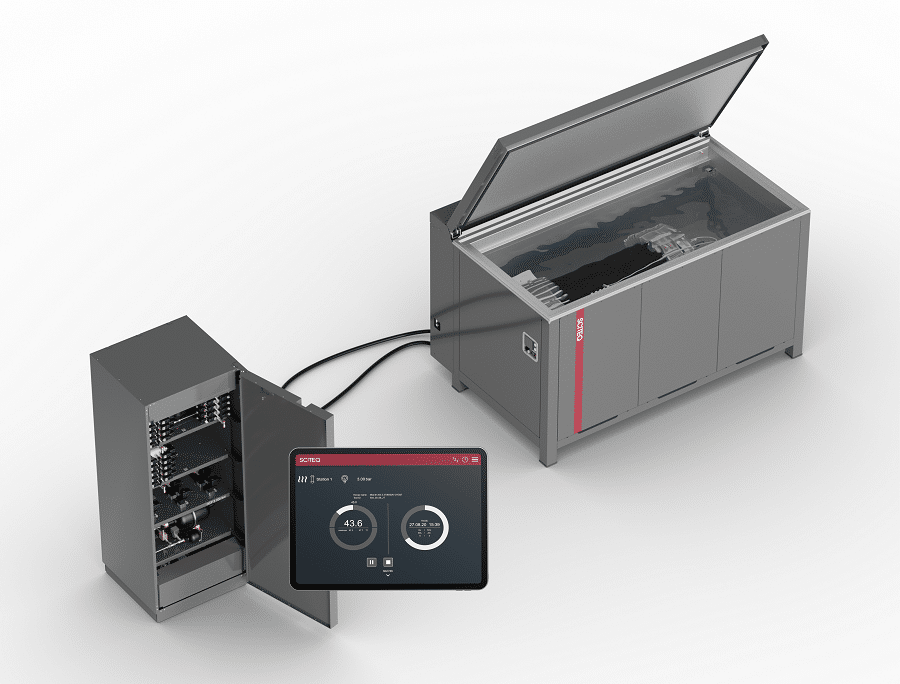We specialize in designing burst and static test using water as medium – for equipment for hydrogen carbon composite pressure cylinders, vessels and tanks. The quality validation is critical to minimizing risks such as leaks, ruptures or failures that can lead to accidents, explosions, or fires. Potential issues like structural degradation, pressure-related failures, or hydrogen permeation highlight the need for rigorous testing to ensure the safety and reliability of hydrogen storage systems.
SCITEQ supplies advanced testing equipment designed to meet a wide range of international standards, helping customers test to and validate the integrity of their products themselves – in R&D as well as batch release.
Our experienced project managers and engineers deliver tailored solutions for each test project, while our skilled service engineers provide global on-site service, training, and 24/7 online support to ensure optimal performance. With decades of experience and a commitment to sustainability.
SCITEQ is trusted worldwide to provide precision testing that drives quality, safety, and reliability.
Learn more
The pressure range for the SCITEQ standard test system is up to 2500 bar. The airless Burst test is performed with water.
Learn moreThe unique and advanced open-loop system of the SCITEQ Cyclic Pressure Test System provides pressure cycles in the range from 2-100 bar with accuracy ≤ ± 1 bar of set pressure.
Learn moreFor internal hydrostatic pressure test at up to 1500 bar with an unparalleled accuracy of 0,5%. For re-inforced vessels, tanks and applications requesting high pressure test approvals.
Learn moreDesigned for testing hydrogen cylinders, tanks, vessels, and other components crafted from materials like reinforced plastics, composites, and steel. The SCITEQ test system ensures safe airless hydrostatic pressure testing.
Learn moreBurst testing is performed with water. This test is often performed as a pre-production test to meet safety and quality standards. The vessel or specimen is filled with water and pressurized untill bursting. The pressure ramp is controlled by the SIGMA software ensuring accuracy and test data analysis. The pressure range for the SCITEQ standard test system is up to 2500 bar. The unique software & intelligent dynamic regulation ensures the most stable and linear pressure regulation in the market. Learn more about the test process
The cyclic test is conducted to replicate the standard lifespan of an object. In the case of a Hydrogen storage tank, the procedure involves filling the vessel with a fluid and applying pressure, followed by an emptying phase that simulates gas consumption. This repetitive cycle, performed thousands of times, serves to emulate the vessel’s long-term usage. Throughout these cycles, critical parameters such as temperature, tank deformation, and potential leakage are monitored to assess the enduring performance over time.
The advanced system of the SCITEQ Cyclic Pressure Test equipment providies pressure cycles in the range from 2-100 bar with accuracy ≤ ± 1 bar of set pressure.
Download PDF
For internal hydrostatic pressure test at up to 1500 bar with an unparalleled accuracy of 0,5%. For re-inforced vessels, composite tanks and applications requesting high pressure test approvals.

Designed for testing tanks, vessels, and other components crafted from materials like reinforced plastics, composites, and steel, the SCITEQ SIGMA test system ensures airless hydrostatic pressure testing. This system is ideal for both R&D purposes and batch release testing, providing highly accurate results. Its modular and expandable configuration allows for future-proof flexibility, making the SIGMA an efficient and cost-effective solution to meet evolving testing requirements.
Download PDF
Learn more about our hydrogen testing equipment for hydrogen storage vessels and tanks.
Our experts are ready to dsicover your possibilities and answer your potential questions
The quality validation testing process for hydrogen vessels and tanks plays a important role in minimizing the inherent risks associated with hydrogen storage, given the highly flammable and potentially dangerous nature of the gas.
The high-pressure test of hydrogen vessels, particularly for internal hydrostatic pressure, involves subjecting hydrogen storage tanks or vessels to extreme pressures to ensure their structural integrity, safety, and compliance with regulatory standards. For hydrogen vessels, especially composite tanks or reinforced vessels, these tests are crucial to validate that they can safely store hydrogen under high-pressure conditions, which is common in fuel cell vehicles, hydrogen storage systems, and other industrial applications.
Hydrostatic testing is generally preferred for its safety advantage, as water is less hazardous than gas under high pressure.
Pressure testing of composite pressure tanks and vessels is a key safety test where the tank is filled with water or another non-compressible fluid, then pressurized beyond its working pressure. The goal is to ensure the tank can withstand pressure without rupturing. Procedure: The tank is filled with water, which is less hazardous than gas. It is pressurized to approximately 1.5 times its maximum operating pressure. The tank is checked for leaks or deformations. SCITEQ equipment is specifically engineered to evaluate the strength, leakage, and deformation of various objects using hydrogen or other fluids as the testing medium.
The SCITEQ Burst Test unit is designed for testing the bursting strength of hydrogen composite pressure vessels by applying water pressure under ambient conditions. The vessel is pressurized until it either reaches the burst point or the target pressure (up to a maximum of 2,500 bar). Compliance with both national and international standards, as well as customer requirements, necessitates batch testing to verify the performance and safety of hydrogen composite pressure vessels.
The cyclic test aims to simulate the expected lifespan of an object. For a hydrogen storage tank, this process entails filling the tank with a fluid and applying pressure, followed by an emptying phase that mimics gas usage. This repetitive cycle, executed thousands of times, replicates the long-term operation of the vessel. During these cycles, essential parameters such as temperature, tank deformation, and potential leaks are continuously monitored to evaluate the tank's performance over time. The SCITEQ Cyclic Pressure Testing System features a unique and sophisticated open-loop system that provides pressure cycles ranging from 2 to 100 bar, with an accuracy of ± 1 bar of the set pressure.
We are at your disposal for any questions, comments and suggestions. We look forward to hearing from you.
Feel free to contact us using the contact form below.
We strive to answer all inquiries within 24 hours (on working days).